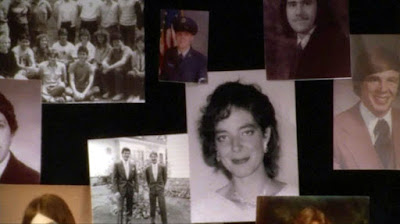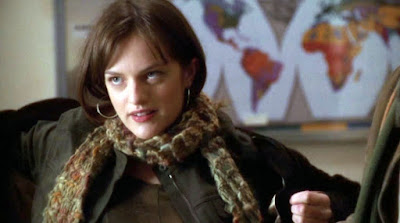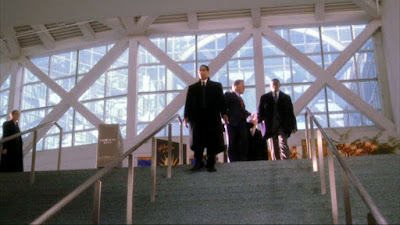Original airdate: January 15, 2003
Written by: Jon Robin Baitz (1)
Directed by: Alex Graves (11)
Synopsis
- In a Very Special Episode of The West Wing, CJ travels to her hometown of Dayton for a class reunion, where her father is dealing with the ravages of the onset of Alzheimer's disease. Oh, and she gets frisky with an old classmate, played by Matthew Modine.
This is an odd one.
Marco: "You're losing time, Mr. Cregg."
Tal: "That, son, I am."
We found out in The Two Bartlets that CJ's father was beginning to suffer from a failing memory. Now, as she comes back home for a whirlwind visit to speak at her high school reunion, we discover how bad things are. Talmidge Cregg is dealing with the early stages of Alzheimer's disease, where his memory starts to dissolve and his grip on his sense of self is loosening. The worst part, of course, is that the disease is at such an early stage that he knows what's coming, and there's nothing he can do about it except wait for it all to slip away. And that knowledge, that realization, spurs anger and frustration and rage at his inexorable destiny:
CJ: "I mean, tell me! You are holding on to something that -"
Tal: "What am I holding on to? My consciousness? My identity?"
CJ: "- can't be willed away by sheer force of personality, dad."
Tal: "Tell me, brilliant woman that you are, would you hand over those things without a fight? I need a little more time, CJ. If I let it in at its own pace, it'll just get dark faster."
As CJ travels to Dayton, she's still tightly connected with what's happening in the White House - she's on the phone with Toby as she goes through airport security, she's still talking to him waiting for her taxi home - it's as if her presence in the West Wing is totally indispensable and the administration can't survive without her there. Then we get to Tal's house - CJ's childhood home - finding it cluttered, with dirty dishes in the sink and barely lit cigarettes strewn all about. CJ has known (from a remove) the general outlines of what her dad is dealing with, but walking into the house, for the first time, she sees the stark reality of the situation. He miscalculates a basic math problem in his head - as a longtime math teacher, this knocks him for quite a loop. He's afraid to admit to CJ that his wife Molly (his second since CJ's mother died) has walked out in frustration.
CJ, with only a day to spare, does what she can to try to make things better. She goes to Molly's daughter's house to call Molly out for abandoning her father; she goes out to the river for a bit of fishing with her dad; she takes him to see a doctor, an old family friend; she takes over behind the wheel when Tal gets confused while driving on a busy street - and all of this before dressing up to go to her reunion to give a speech.
Of course it's all for naught, at least for the immediate term. Tal, knowing he's in a losing battle, refuses to give up his independence, refuses to give in to the onrushing darkness, and refuses to accept help. Molly bitingly complains about losing out on her time with Tal, time they put off through multiple marriages, and now that they're finally able to come together she discovers he's not going to be the person she knew for all those years. And she's ticked off about it.
Moffatt gives an achingly real portrayal of a husband and father fighting back against the inevitable. His anger, his frustration, his mental failings leaving him unable to recognize his daughter standing right in front of him ... it's truly heartbreaking. And Janney, of course, is outstanding - trying to reach out, trying to find the simple fix to make things better (in a single day), her deep sighs in private and her tears welling up when Tal admits he doesn't know who is in this photograph - a photograph of a young CJ.
(Speaking of which, while I'm just guessing that photo is actually of a young Janney, we definitely can recognize the high school photograph of Janney that we see in the class reunion decorations.)
It's understandable that CJ reaches out for solace with a high school classmate, Marco Arlen. They bump into each other at the airport as they arrive in Dayton, and after a moment of reminiscing, it's understandable that they agree to attend the reunion together to support each other. When they do arrive at the restaurant parking lot, just after the emotionally gutting moment when Tal can't recognize CJ as a child, she can't face it, she can't face giving a speech or putting on a brave face in front of her classmates. In fact now, for the first time, she can't even answer an (urgent) phone call from Toby. "I don't think I can ... face it right now," she tells Marco. Totally understandable.
Which leads us to a motel room; a couple of bodies intertwining, out of focus, in the bedsheets; a bit of post-coital pillow talk where Marco the horologist is able to point out that the motel clock is 20 minutes fast.
(Again, CJ is making maximum use out of this single day in Dayton - she called out her stepmother, went fishing, took her dad to see a doctor, saved him from a car accident, got dressed up for a speech, went to the restaurant, left for a motel, had sex, and then still gets back to the restaurant after dinner to actually give the speech. That is one busy day.) Anyway, this plot choice is less understandable, to me at least. Having CJ fall into a "quickie" with someone she hasn't seen in 20-plus years, just because her nerves are shot from the situation with her father?
The West Wing has never been an overly romantic TV series, not in the traditional sense. Of course it's a very romantic view of progressive politics and humans striving to use the levers of government to do the right thing, but other than a bit of kissing here and there (and a very sexy tying of Josh's bow tie by Donna) there's never been any actual, you know, loving going on onscreen. But we have it here, with our CJ, falling into bed with a guy she barely knows, right there out-of-focus on our TV screens. I mean, as a play script about a high-powered political character finding herself lost from her moorings because of family drama and searching for momentary comfort in the midst of personal crisis, okay, it's good drama - but again, it's not really CJ and it's not really The West Wing.
Anyway ... CJ and Marco get themselves cleaned up and back to the reunion in time for her speech. And let's admit this, too, it's not a good speech, at all. It doesn't sound like CJ, it doesn't sound like anybody spent any time on it, it's a cliche-filled lazily written thing titled "The Promise Of A Generation." True, CJ didn't pick the topic, but her writing of the speech is just not very good.
(What I do like, though, is that topic. It ties right into the theme of time, of family, of promises we make to each other and promises we try and sometimes fail to keep. It works from two perspectives, at least as it applies to CJ in a very personal way: it's the promise of Tal's generation, the promise of fathers to always be there as the rocks for their children, a promise Tal is now finding unable to keep; and it's the promise of CJ's generation, of sons and daughters, to take care of their parents when they are unable to take care of themselves, a promise CJ is trying her best to uphold but finding very, very difficult. Anyway, I give Baitz credit for that speech topic, cause it really hits the mark.)
As CJ speaks, Tal and Molly and Molly's daughter appear in the back of the room, just as Molly had pictured being able to do before the crumbling of Tal's mental stability. That's a nice moment, perhaps the best plot wrap-up we could hope for ... Tal's never going to get any better, there isn't going to be a happy ending of this story, but at least for now, for this night, he gets to be the proud father watching his daughter speaking in front of a crowd.
Until the White House intrudes, again. But ... why on earth is CJ answering her phone while she's in the middle of giving a speech to her class reunion? That's just nuts (especially considering she refused to answer a call earlier in the evening while sitting in the parking lot). This is a cheap shortcut to get us to the end of the story - some urgent crisis with bomb threats to embassies overseas, which means the White House Press Secretary has to drop what she's doing and dash back to DC because the administration would cease to function without her there. I mean, they have people in place to handle things while she's gone. The fate of the embassies doesn't rest in CJ's hands. But, yeah ... that's what Baitz decided to do to close out the episode.
Is The Long Goodbye good television? Like even the unsteady Season 5, a poor episode of The West Wing is better than a lot of things on TV, so I'd say yes. There are problems with the plotting, shortcuts with the script, some howlers in characterization of people we've gotten to know over the past three-plus years ... but the depiction of Alzheimer's disease, its effects on those suffering from it as well as those who love and care for them, the performances from Janney and Moffatt, all lift this episode up and make it better than it has a right to be.
But it's still not an episode of The West Wing.
Tales Of Interest!
- About the Sorkin situation with this episode: By this point in the series, with cast expenses rising and the show's budget starting to strain the network and the studio, Warner Brothers was leaning on Sorkin to find ways to cut costs while still submitting a full slate of 22 or 23 episodes a season. Sorkin, always a perfectionist who worked on scripts until the last minute, rapidly fell behind schedule every year, with the shows at the end of the season often not having a full script until shooting was about to begin. This led to budget overruns on locations and crew costs, since plans couldn't be made until the last minute and then they had to be accomplished then regardless of the cost.
- The West Wing is famous for shots of characters being seen through camera lenses and TV monitors. We get some of that right off the bat here, with CJ at her press briefing being shown on multiple screens as she speaks to the press in front of us.
Quotes
Tal: "Tell me everything. I want to know everything. Let's sit up all night and catch up. I don't seem to do much of that anymore. Ticking clocks, you know, and so much to do."
CJ (on phone): "I want to be clear about the briefing, Toby. What I meant when I said that you need to know who to look at and when to ask certain questions is avoid the calm ones. Get the anxious ones out of the way first, to give the pros room to figure out what it is they really want. And avoid the ones who don't blink. They're power devils."
Toby: "I don't know what that is."
CJ: "You were a wonderful teacher, Molly. You should be ashamed of yourself."
Molly: "Well, I am."
Tal: "Who are you? All these damn women hounding me! My mother, my mother calls this morning to remind me to fold the socks when I get back in. And my daughter just abandoned me! Mothers, wives, daughters, and none of them stay! All these damn women!"
Tal: "I'd much rather see you on TV, darling, than sitting opposite me, watching the demolition derby going on in my brain."
-----
Tal (watching Toby on TV): "That man lacks grace and charm."
Story threads, callbacks, and familiar faces (Hey, it's that guy!)
- Matthew Modine (Full Metal Jacket, Birdy, Vision Quest, Stranger Things) appears as Marco Arlens, CJ's punk-rock baseball-playing high school classmate who is now a watchmaker in Paris.
- Donald Moffatt (The Thing, The Right Stuff, Clear And Present Danger) is outstanding as Talmidge Cregg, CJ's father.
- Verna Bloom (National Lampoon's Animal House, High Plains Drifter) appears as Molly, Tal's third wife struggling with his disease and his loss of self.
- Okay - why is the Communications Office even entertaining the idea of Josh briefing the press? In the opening scene we hear CJ tell the reporters that, unlike what had been announced, Josh will not be doing the press briefings while she goes out of town. We can't help but remember Josh's disastrous performance in the briefing room in Celestial Navigation and his revealing of the President's "secret plan to fight inflation" - a performance so bad the President himself banned him from ever doing it again. Yet, here we are ... although Josh makes sort of a reference to that experience in mentioning the reporters' "sadistic, anticipatory glee" at having him at the podium.
- CJ's father has been mentioned twice before: In The Stackhouse Filibuster CJ was writing an email to him, apologizing for being late for his 70th birthday party in Napa that weekend. In The Two Bartlets for the first time CJ refers to her father's struggle with remembering things, while also blaming affirmative action for holding back his career and perhaps contributing to his failing mental health.
If Tal had been turning 70 in The Stackhouse Filibuster, which was set in late March of 2001, that means he'd be 71 in this episode, nearing his 72nd birthday.
- Tal makes a comment about a "nice lady from Catholic Family Services." We first discovered CJ was Catholic in The Crackpots And These Women, when Josh asked her if she was familiar with Ave Maria.
- We found out in The Black Vera Wang that CJ has two older brothers (and at least one niece). There's not a mention of the brothers or any other siblings at all in this episode, which seems a bit odd considering the stakes of what's happening to their father.
- WHAT'S NEXT MOMENT - Somewhat surprisingly in an episode without an appearance by President Bartlet, we actually do get a "What's next?" moment, this time from Marco.
Marco: "No, I think the best day's gotta be the next day. Life is all ... 'what's next?'"
DC location shots
- This episode was actually shot in the Chicago area, mostly in the Oak Park and Elmwood Park suburbs. Original plans were to film in Dayton, but it turned out to be cheaper to film in Chicago instead. Here's the Cregg family house, which is somewhere in Oak Park (I wasn't able to find the actual address in my sleuthing):
- The street scene with CJ and Tal driving was filmed mostly along West Taylor Street, just west of the University of Illinois-Chicago and near the Illinois Medical District (south of the Eisenhower expressway and west of the Kennedy). The scene where they drive off after CJ takes the wheel is near the intersection of Taylor and Loomis, looking east on Taylor.
- Horwath's Restaurant was located at 1850 North Harlem in Elmwood Park, Illinois. A mainstay of the area since 1931, it apparently closed in 2004, just over a year after this episode aired. It appears there's now a diving and swim school located at this spot.
They Do Exist! It's The Real Person, or Thing
- Seeing Marco at the airport, CJ is reminded of the Violent Femmes, among other things.
- Tal says, "You could blast (Edward) Elgar in here with 25 speakers, you wouldn't wake up Molly." Later, while fishing with CJ, he quotes the mathematician Blaise Pascal ("We sail in a vast sphere, ever drifting in uncertainty, driven from end to end").
- Tal's cat is named Archimedes, after the ancient Greek mathematician and inventor.
- Tal mentions the drug Reminyl, which is indeed the brand name for a form of cognition-enhancing medication.
- We see the C-SPAN logo on the television as Tal and CJ watch Toby's frenzied press briefing ("That man lacks grace and charm").
- Hamilton continues to be a well-esteemed watchmaking company, although their operations moved out of the United States in the 1950s.
- CJ brings up F. Scott Fitzgerald's pessimistic view of the future to Marco.
- We hear the Ramones song I Wanna Be Sedated playing while CJ and Marco sit in the parking lot outside the reunion. If that's a song from their high school days, it was released in the fall of 1978, so that would place this graduating class around 1979 or 1980.
- The "motel" where CJ and Marco have their dalliance is actually the Wyndham Drake hotel (as we can tell from this shot of the telephone in the room), which was located in Oak Brook. The hotel was sold in 2009 and is now called the Drake Hotel Oak Brook.







































